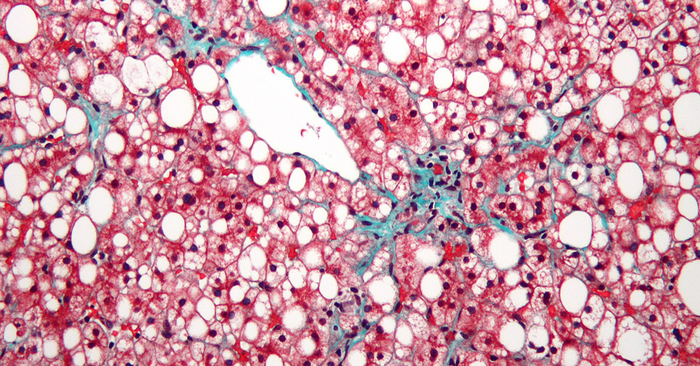Approximately one-fourth of the general population worldwide has nonalcoholic fatty liver disease, known as NAFLD, an umbrella term for a range of liver conditions affecting people who drink little to no alcohol. NAFLD can lead to cirrhosis, liver cancer and liver failure.

Credit: Nephron
Approximately one-fourth of the general population worldwide has nonalcoholic fatty liver disease, known as NAFLD, an umbrella term for a range of liver conditions affecting people who drink little to no alcohol. NAFLD can lead to cirrhosis, liver cancer and liver failure.
In a new study, researchers at the University of California San Diego School of Medicine found that first-degree relatives of patients with NAFLD characterized by advanced fibrosis are at a 15% risk of developing the condition.
The results, published in the November 1, 2022, online edition of Journal of Clinical Investigation, shine a spotlight on the importance of early screening of both siblings and offspring of patients with NAFLD.
“Until now, first-degree relatives accompanying their loved ones with liver disease for medical treatment didn’t know they were at a greater risk of developing advanced fibrosis themselves,” said Rohit Loomba, MD, the study’s first author, professor in the Division of Gastroenterology at UC San Diego School of Medicine and director of hepatology at UC San Diego Health.
“Liver disease is a silent killer. Most people don’t know they have a liver problem until it’s advanced and they develop cirrhosis because there are no obvious symptoms.”
According to Loomba, the study’s findings could play a key role in early detection.
“Our goal and mission are to identify patients who have more advanced liver problems earlier, and non-invasively, to prevent the progression to cirrhosis,” said Loomba, director of UC San Diego School of Medicine’s NAFLD Research Center.
NAFLD is a complex metabolic disease with underlying genetic and environmental risk factors. Recent studies have demonstrated that NAFLD and NAFLD-related liver fibrosis are hereditary, and that advanced fibrosis may cluster within the same families.
The study involved nearly 400 first-degree relatives enrolled in two independent cohorts from the United States and Finland. Liver fibrosis was evaluated using magnetic resonance elastography and other noninvasive imaging modalities.
The results have given researchers the scientific evidence needed to recommend routine screenings for advanced fibrosis among first-degree relatives of patients with cirrhosis or advanced fibrosis.
“Siblings and offspring of patients should be evaluated around age 40 or 50,” said Loomba. “Our findings could change the standard of care for this high-risk population.”
Loomba added that educating first-degree relatives about risk factors, including excessive drinking, weight gain and a sedentary lifestyle are also key.
“Many liver disease-related genes modify based upon a person’s lifestyle and what they eat. That means first-degree relatives can help prevent developing advanced fibrosis if they are aware of the risk and willing to make lifestyle modifications,” Loomba said. “Patients should be informed of what their risk is, because then they are more likely to change their behavior and lifestyle.”
Looking ahead, Loomba said the next step will be to determine genetic factors within families that increase the risk of NAFLD to identify and treat patients earlier.
Co-authors of the study include: Nobuharu Tamaki, Noora Ahlholm, Suzanne R. Sharpton, Veeral Ajmera, Yuko Kono, Shravan Dave, Aijaz Ahmed, Vinay Sundaram, Michael Wilkinson, Heather Patton, Hersh Gupta, Vanessa Cervantes, Christie Hernandez, Scarlett J. Lopez, Ria Loomba, Amanda Baumgartner, Lisa Richards and Perttu E.T. Arkkila, all at UC San Diego; and Panu K. Luukkonen, Kimmo Porthan, Katriina Nemes, Helena Isoniemi and Hannele Yki-Järvinen of the University of Helsinki.
# # #
Journal
Journal of Clinical Investigation
DOI
10.1172/JCI162513
Article Publication Date
1-Nov-2022
COI Statement
Rohit Loomba serves as a consultant to Aardvark Therapeutics, Altimmune, Amgen, Anylam/Regeneron, Arrowhead Pharmaceuticals, AstraZeneca, Bristol Myers Squibb, CohBar, Eli Lilly, Galmed Pharmaceuticals, Gilead, Glympse Bio, Hightide, Inipharma, Intercept, Inventiva, Ionis, Janssen, Madrigal Pharmaceuticals, Merck, Metacrine Inc., NGM Biopharmaceuticals, Novartis, Novo Nordisk, Pfizer, Sagimet, Terns Pharmaceuticals, Theratechnologies, and Viking Therapeutics. Research grants were received from Arrowhead Pharmaceuticals, Astra¬Zeneca, Boehringer Ingelheim, Bristol Myers Squibb, Eli Lilly, Galectin Therapeutics, Galmed Pharmaceuticals, Gilead, Hanmi Pharmaceutical, Intercept, Inventiva, Ionis, Janssen, Madrigal Pharmaceuticals, Merck, NGM Biopharmaceuticals, Novo Nordisk, Pfizer, Sonic Incytes and Terns Pharmaceu¬ticals. Loomba is a cofounder of LipoNexus Inc. Hannele Yki-Järvinen serves as a consultant or an advisory board member for Boehringer Ingelheim, Eli Lilly, Glaxo, Hanmi Pharmaceutical, Inipharm, MSD, and Novo Nordisk. Suzanne R. Sharpton serves as a consultant for Ionis.




